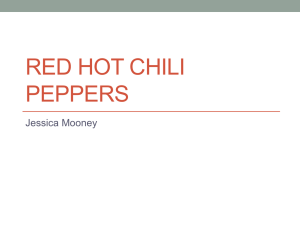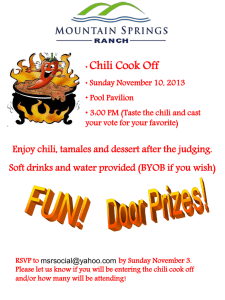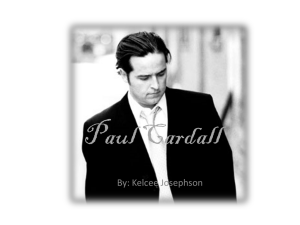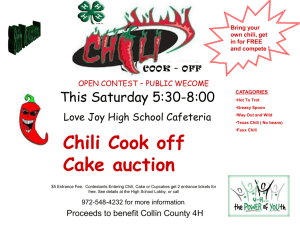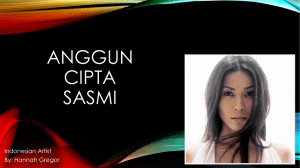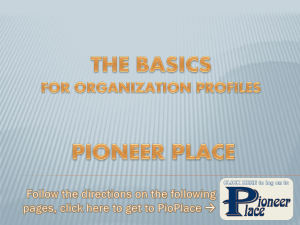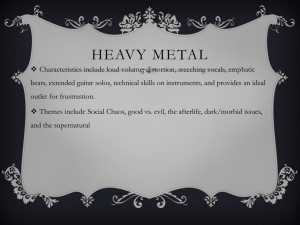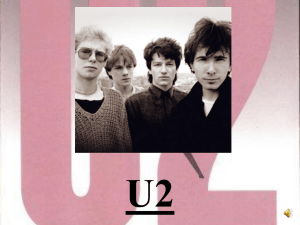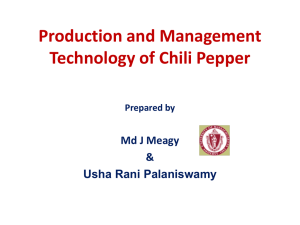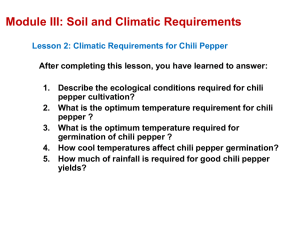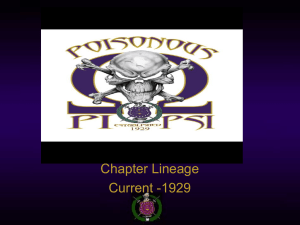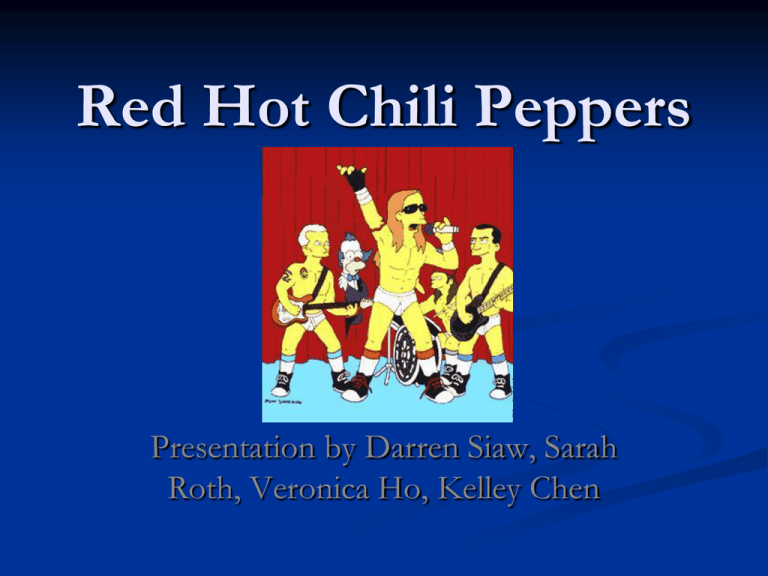
Red Hot Chili Peppers
Presentation by Darren Siaw, Sarah
Roth, Veronica Ho, Kelley Chen
Biography
Formed 1983 in Los Angeles
Current Line up:
Anthony Kiedis: Vocals and lyrics 1983-present
Born Nov. 1962 in Grand Rapids, Michigan
Moved at 12 to LA to live with father who introduced him to a sex, drugs and rock n’roll lifestyle
Attended Fairfax High School. While there, became close friends with Flea and original guitarist
Hillel Slovak
Graduated with honors and briefly attended UCLA
Life long problems with addiction, especially heroin
Michael “Flea” Balzary: Bass 1983-Present
Born Oct. 1962 Burwood, Australia
Originally very into Jazz. Was introduced to various forms of rock by Anthony and Hillel
Has collaborated with a wide variety of artists including Johnny Depp’s Music project P
Both Anthony and Flea have acted in numerous movies (IMDB.com)
Currently attending USC
studying Music Theory
Chad smith: Drums 1989-Present
Born October 1961 Richfield, Minnesota
Joined RHCP 3 weeks before beginning of recording of Mother’s Milk after an initially reluctant
band was blown away by his audition
Has participated in a number of musical side projects
Josh Klinghoffer: Guitar 2010-Present
Born October 1979
Multi instrumentalist who has worked as a session and touring musician with many acts
Replaced friend John Frusciante as guitarist for RHCP
Biography (cont.)
Formed 1983. Founding members were Anthony Kiedis, Hillel Slovak, Flea and Jack Irons
Originally called Tony Flow & the Miraculously Majestic Masters of Mayhem
After the huge success of their 1st performance at the Rhythm Lounge which was originally
intended to be a one off performance, changed name to Red Hot Chili Peppers
After playing shows for several months around LA where they developed their ‘high energy,
wearing nothing but a sock performances’, they were signed to EMI
August 1984 Debut Album The Red Hot Chili Peppers to mild success on MTV and college
radio, but the band felt the album was too polished
1986 released the George Clinton produced Freaky Styley which incorporated strong funk
influences. Only mildly successful, but spawned a few movie cameos
Biography (cont.)
1986 heroin use of especially Anthony and Hillel had spiraled out of control, Jack
Irons joins the band full time and Anthony is briefly fired.
Named LA Weekly’s “Band of the Year” which inspired Anthony to go into rehab and
resume work on the next album
1987 Wrote and recorded The Uplift Mofo Party Plan in 10 days. Anthony suffered
relapse during recording. Album peaked at 148 on Billboard charts.
June 25, 1988 Hillel died of a heroin overdose. Anthony too upset, fled LA and didn’t
attend his funeral. Death also caused Irons to leave the band for Pearl Jam.
1989 John Frusciante replaced Hillel’s spot as guitarist . The jam session audition
ended up as “Pretty Little Ditty” on their next album Mother’s Milk
Chad Smith was added as drummer 3 weeks into the Mother’s Milk recording sessions
after his audition blew the band away and convinced a previously reluctant Anthony to
let him join.
Mother’s Milk recording was plagued by conflict with the
producer
who wanted to give the album a loud guitar heavy
metal
sound, but the album was the band’s first gold record and
spawned several hits including a cover of “Higher Ground” and
“Magic Johnson” which is still used at LA Lakers games.
Biography (cont.)
1990 switched to Warner Bros. Records and hired Rick Rubin to produce their next
album (he has produced every studio album since). Recorded Blood Sugar Sex Magik
in a mansion once owned by Houdini which the band was convinced was haunted.
Session were filmed by Flea’s brother-in-law for the documentary Funky Monks.
Released Sept. 1991, Blood Sugar Sex Magik became their break into the mainstream
and superstardom. “ Give it away” reached # 1 on Modern Rock chart and won a
Grammy for Best hard Rock Performance. “Under the Bridge” reach #2 on the
Billboard Chart. The album reached #3.
1992 John Frusciante, uncomfortable with the suddenness and scale of success quits.
Biography (cont.)
Appear on the season 4 finale of The Simpsons
Performed and won 3 of 7 MTV Video Music Awards they were nominated for.
http://www.youtube.com/watch?v=Ll7FW1XoYzo
1992 settled on former Jane’s Addiction guitarist Dave Navarro
1994 Played Woodstock with Navarro on guitar
http://www.youtube.com/watch?v=vwYvNW3eSXY
On tour opening for the Rolling Stones differences began to arise between Navarro
and the other members and Anthony relapsed after a dental procedure.
Sept. 1995 One Hot Minute released after delays. A sadder feel and a more heavy metal
sounding guitar characterized the album. “My Friends” became their 3rd #1 song.
And the band appeared on several more soundtracks.
1998 Navarro left the band
John Frusciante after leaving the band had become a severe heroin addict. By 1998
broke and near death, he entered rehab. Meanwhile the band had decided they
wouldn’t go on without Frusciante and he rejoined.
June 1999 Californication released and has become their most successful album
spawning 3 #1 Modern Rock Hits (“Scar Tissue”, “Otherside”, and “Californication”).
The album was more melodic than their previous work.
http://www.youtube.com/watch?v=YlUKcNNmywk
Biography (cont.)
Perform for a second time at Woodstock. Things went south during a cover of
Hendrix’s “Fire” when a fire followed by vandalism, looting and sexual assault
erupted.
"It was clear that this situation had nothing to do with Woodstock anymore. It
wasn't symbolic of peace and love, but of greed and cashing in... We woke up to
papers and radio stations vilifying us for playing 'Fire'.“ –Anthony Kiedis
(autobiography)
2000 “Scar Tissue” won the Grammy for Best Rock Song and the band performed at
the Billboard Awards with Snoop Dogg.
http://www.youtube.com/watch?v=sp7PBrYXD6c
Biography (cont.)
• 2001 began recording By The Way and artistic differences began to emerge between
Flea and Frusciante.
• July 2002 By The Way released and spawned 5 hit singles and marks a move toward
and even more melodic sound under the influence of Frusciante.
• The 18 month tour which followed resulted in their first live album Live at Hyde Park.
The concert ranked #1 on Billboard’s Top Concert Boxscores for 2004.
• 2006 released double album Stadium Arcadium which was their first album to debut
at #1. Also debuted at #1 in 26 other countries becoming the highest selling album of the
year.
• Single “Dani California” became their fastest selling single to date and debuted at #1 on the
Modern Rock Chart. The album marked the first time the band had 3 consecutive #1
singles. http://www.youtube.com/watch?v=Sb5aq5HcS1A
• 2007 Stadium Arcadium won 5 Grammys
• Tour for album saw the addition of Frusciante’s friend Josh Klinghoffer to the live line up
and the tour concluded with a performance at Live Earth in Wembley Stadium
Biography (cont.)
2007-2009 band members work on solo and side projects. Flea enrolls in USC to
study Music Theory. Kiedis is awarded the Stevie Ray Vaughan Award for his
charitable work with music and drug addiction programs
Sept. 2009 nominated for induction into the Rock and Roll Hall of Fame
December 2009 John Frusciante left RHCP to focus on solo work and is replaced by
Josh Klinghoffer
2010 refused to allow the show Glee to use their songs
Their next album I’m With You is set to be released August 2011
Musical Style
Funk + Punk rock
= a new musical style they created!
Musical Style
Instrumentation (at present)
Vocal
Anthony Kiedis
http://www.listal.com/viewimage/1317038h
- spoken verse and
rapping mixed with
more traditional
approaches
Musical Style
Instrumentation (at present)
- “The groove-heavy,
low-tuned melodies,
played through either
normal finger style or
aggressive slapping”
(LyricsFreak)
- more melodic bass
lines in later albums
Bass
Michael "Flea" Balzary
http://www.nj.com/entertainment/celebrities/index.
ssf/2007/11/25-week/
Musical Style
Instrumentation (at present)
Drum
Chad Smith
http://weheartdrums.wordpress.com/
2011/05/17/chad-smith/
- rapid bass drum
- blends rock with funk
Musical Style
Instrumentation (at present)
Guitar
Josh Klinghoffer
http://www.stadium-arcadium.com/joshklinghoffer-news-red-hot-chili-peppers-rhcp/latestnews-josh-klinghoffer-rhcp-red-hot-chilipeppers.php
Musical Style – Lyrics
Use of imagery to present their statement on the
subject matter
“Blood sugar sucker fish
In my dish
How many pieces do you wish?”
Representing
the
government
Their Stage Gimmick
Performing on-stage naked
Eventually becomes their trademark
http://www.youtube.com/watch?v=r9XGkdZquk4
Musical influences on
the Red Hot Chili Peppers
Their music is largely influenced by funk,
alternative rock, hard rock and punk rock
They have drawn their influences from a wide
range of bands before them: Jimi Hendrix, Sly &
the Family Stone, Bootsy Collins, The Stooges,
Stevie Wonder, Iggy Pop, Led Zeppelin, Cream,
Bad Brains, The Meters, The Beatles, Marvin Gaye
and more
They have also drawn inspiration from their
contemporaries: Radiohead, Nirvana, Jane’s
Addiction, Pearl Jam and Foo Fighters
Musical influences on selected
discography
Blood Sugar Sex Magik (1991)
Cited influences by the band: Jimi Hendrix,
Robert Johnson, Led Zeppelin, The Smiths,
Siouxie & The Banshees, Bow Wow Wow,
New Order, Joy Division, The Police, Fugazi
Musical influences on selected
discography
Californication (1999)
Cited influences by the band: B-52s, New
Order, Joy Division, Jane’s Addiction, The
Cure, Fugazi, Black Flag, The Germs, Echo
& The Bunnymen, The Ramones
Musical influences on selected
discography
By The Way (2002)
Cited influences by the band: Queen, XTC,
Gary Numan, Kraftwerk, Human League,
Depeche Mode, The Smiths, The Beatles,
Erasure, The Beach Boys, The Rolling
Stones
Influences by the Red Hot Chili
Peppers
Flea’s “slap bass” technique, though not
invented by him, was popularized by him
and made him a world renowned bassist.
Bands like Korn and Primus would be
directly influenced by Flea’s bass technique
They have influenced the rap rock crossgenre which fused vocal and instrumental
elements of hip hop with various forms of
rock. Bands like 311 and Linkin Park are a
direct lineage
They have influenced rap metal which was
a big movement during the late 90’s
through bands like Limp Bizkit, Deftones,
Incubus and more
Bands influenced by the Red Hot
Chili Peppers
Primus, 311, Rage Against The Machine, Insane Clown Posse, Bloodhound
Gang, Living Colour, Sublime, Sugar Ray, No Doubt, Beck, Incubus, Linkin
Park
Social & Political Issues: Drug
Use
1985: 1/3 of Americans
reported they had tried
marijuana
mid-80s: introduction of crack
cocaine became a huge issue
among youth
1990s: increase in the use of
heroin and “club drugs”
The Red Hot Chili Peppers
(RHCP) song “Under The
Bridge” addresses the singers’
dependence on narcotics
“Police Helicopter” is about the
unforgiving LAPD’s crackdown
on drug abuse in the lead
singer’s neighborhood
Social & Political Issues:
Plasticity
“Born and raised by those
who praise control of
population,
everybody’s been there and I
don’t mean on vacation.”
- RHCP,
Californication
Californication addresses
upper class America and
its plastic nature.
Social & Political Issues: Environmental
Activism
Lead Singer Anthony
Kiedis is known for raising
awareness about
environmental concerns
Has been a part of
environmental activist
panels
“Can’t Stop” mentions
Julia Butterfly Hill (an
environmentalist who lived
in a tree for 738 days) in its
lyrics
Song analysis: Under The Bridge
Their first major cross-over hit
Peaked at #2 on Billboard 100
Certified platinum by the RIAA
Song is largely inspired by “Little Wing” by Jimi Hendrix
http://www.youtube.com/watch?v=GLvohMXgcBo
Song analysis: Under The Bridge
Elements of music
Tempo: Moderate, strong backbeat
Meter: 4/4 with duple meter, duple subdivision
Vocals Range: narrow
Melody: Conjunct, heavily bass driven
Timbre: Male vocals, electric guitar, bass, drums, choir
background vocals
Dynamics: Fluctuation in volume to accentuate chorus
Lyrics: Tribute to L.A. with references to the loneliness and
troubled times during Kiedis' heroin use.
Song analysis: Under The Bridge
Musical Structures
Guitar intro
A Verse 1 (inner form: a a a b)
A’ Verse 2 (inner form: a a a b)
B Pre Chorus (inner form: a a a a’)
A’’ Verse 3 (inner form: a a a b)
B’ Pre Chorus (inner form: a a a a’ a”)
C Chorus (inner form: a a a a a’)
Guitar outro
Song analysis: Under The Bridge
Texture Analysis
Guitar intro
monophonic
Verse 1 “Sometimes I feel…”
Homophonic, melody and accompaniment
Verse 2 “I drive on the streets…”
Homophonic, melody and accompaniment
Pre Chorus “I don’t ever wanna feel…”
Homophonic, melody and accompaniment
Verse 3 “It’s hard to believe…”
Homophonic, melody and accompaniment
Pre Chorus “I don’t ever wanna feel…”
Homophonic, melody and accompaniment
Chorus “Under the bridge downtown…”
Homophonic, chordal
Guitar outro
Homophonic, chordal
References
Apter, J. (November 23, 2004). Fornication: The Red Hot Chili Peppers Story. Omnibus Press.
Brown, J. (June 1, 2008). Red Hot Chili Peppers: In The Studio. Colossus Books
Conlon, K. (2006, September 12). Chevy Sequel Hot Enough for Red Hot Chili Peppers, Anthony
Kiedis. Retrieved June 7, 2011, from hybridcar.com:
http://www.hybridcar.com/index.php?option=com_content&task=view&id=200&Itemid=2
Crossdale, A. (2011, April 13). Music Subcultures – Going Underground. Retrieved June 7, 2011,
from Me-dia/You-dia: http://mediayoudia.wordpress.com/2011/04/13/music-subcultures%E2%80%93-going-underground/
Elford, C. (August 19, 2009). A Literary Analysis of Red Hot Chili Peppers Lyrics.
Retrieved June 4, 2011, from rvanews:
http://rvanews.com/features/a-literary-analysis-of-red-hot-chili-peppers-lyrics/20505.
Julia Butterfly Hill. (2011, May 2). Retrieved June 7, 2011, from Wikipedia:
http://en.wikipedia.org/wiki/Julia_Butterfly_Hill
Kiedis, A., & Sloman, L. (October 6, 2004). Scar Tissue. Hyperion
Mullen, B. (October 19, 2010) Red Hot Chili Peppers: An Oral/Visual History. It Books
NPR Staff (January 15, 2011). Chili Peppers Boo: Part Scrapbook, Part Love Letter.
http://www.npr.org/2011/01/15/132945309/the-red-hot-chili-peppersblood-sugar-sex-and-magic?sc=fb&cc=fp
References (cont.)
Pareles, J (February 12, 1996). POP REVIEW; A Man Who Can Rap And Also Has Muscles.
The New York Times, p. 1.
Prato, G. (1997). Red Hot Chili Peppers Biography. Retrieved June 4, 2011, from Artist Direct:
http://www.artistdirect.com/artist/bio/red-hot-chili-peppers/483511.
Red Hot Chili Peppers. (n.d.). Retrieved June 5, 2011, from http://www.redhotchilipeppers.com/
Robison, J. (2002, July 9). Decades of Drug Use: The '80s and '90s. Retrieved June 7, 2011, from
Gallup: http://www.gallup.com/poll/6352/decades-drug-use-80s-90s.aspx

